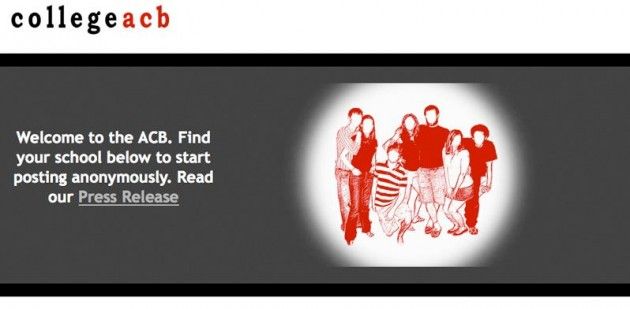Administration Put Symbolic, Indefinite Ban on CollegeACB
Recent events have demonstrated just how effective the Internet is at spreading information across college campuses – for better or for worse.
In response to a post on CollegeACB.com about a first-year student, the Colgate University network no longer allows access to the website.
While the website was blocked on October 28 of last year, according to Chief Information Officer David Gregory, the block only impacts students on campus, leaving the website accessible to students at Barge Canal Coffee Co. or from their home computers.
Traffic to the website across the country brings in more than 20 million page views every month and at the time of this writing, posting to the website continued with a response early Monday morning.
Dean of the College Charlotte Johnson said the blocking was largely symbolic and created a push to establish a policy on anonymous cyber-harassment.
“It gave us an opportunity to say ‘okay, let’s come up with a policy on when, if ever, we would block some sites from our network,'” Johnson said.
Despite this original push, both Johnson and Dean of the Faculty Lyle Roelofs, who oversees the Committee on Information Technology (CIT), said no such policy has been created and will most likely not be created.
“The committee met … and I asked if they wanted to recommend to me a university policy in this area and the result was they didn’t see a way to articulate the policy that would be sufficiently general,” Roelofs said, adding, “They were content to leave this as sort of an ad hoc basis.”
As this is the first time Johnson can recall Colgate blocking access to a website, she said the decision was a serious one, as she was conscious of both free-speech concerns and the harassment of a student.
“The decision to block was not taken lightly given that this is an academic environment and given that the block was largely symbolic,” Johnson said.
The website remains blocked on the networks and Gregory said there is no expiration date for the ban, meaning that CollegeACB. com will continue to be blocked indefinitely.
First-year student Paul Donahue said while he saw the potential harm posts on websites like CollegeACB could cause, he did not agree with the administartion’s response.
“This was a very lazy approach to the situation and not thought-out,” Donahue said. “They actually didn’t accomplish what they set out to do and took away something that could have been useful.”
Roelofs said he saw it as a waste of school resources and said he dealt with it in a way that prevented University resources from being used to harass students.
“It’s a resource question if our network can be used in harmful kinds of ways, we should do things to whatever extent we can to prevent that and make sure it is used for the purposes we need it to be used for,” Roelofs said. “It’s simply part of the management picture.”
Others said they saw it as the University protecting itself from events down the road, particularly in light of recent suicides resulting from videos and other posts to the internet.
“I can understand the fact that they would have to come up with a policy, but you can still go on it, so it really didn’t do much,” sophomore Nell Lapres said. “It is the college covering [themselves], people can still go on it using proxies so it’s an ineffective blocking.”
Despite arguments on both sides of the issue, both Roelofs and Johnson expressed the limited options the University had when responding to such anonymous posts.
“My sense is when it turns into a harassment of an individual student by name, it is important for the university…to do what [it] can to prevent that kind of [activity],” Roelofs said. “We can at least not allow Colgate resources to be used; that’s about all we can do.”







